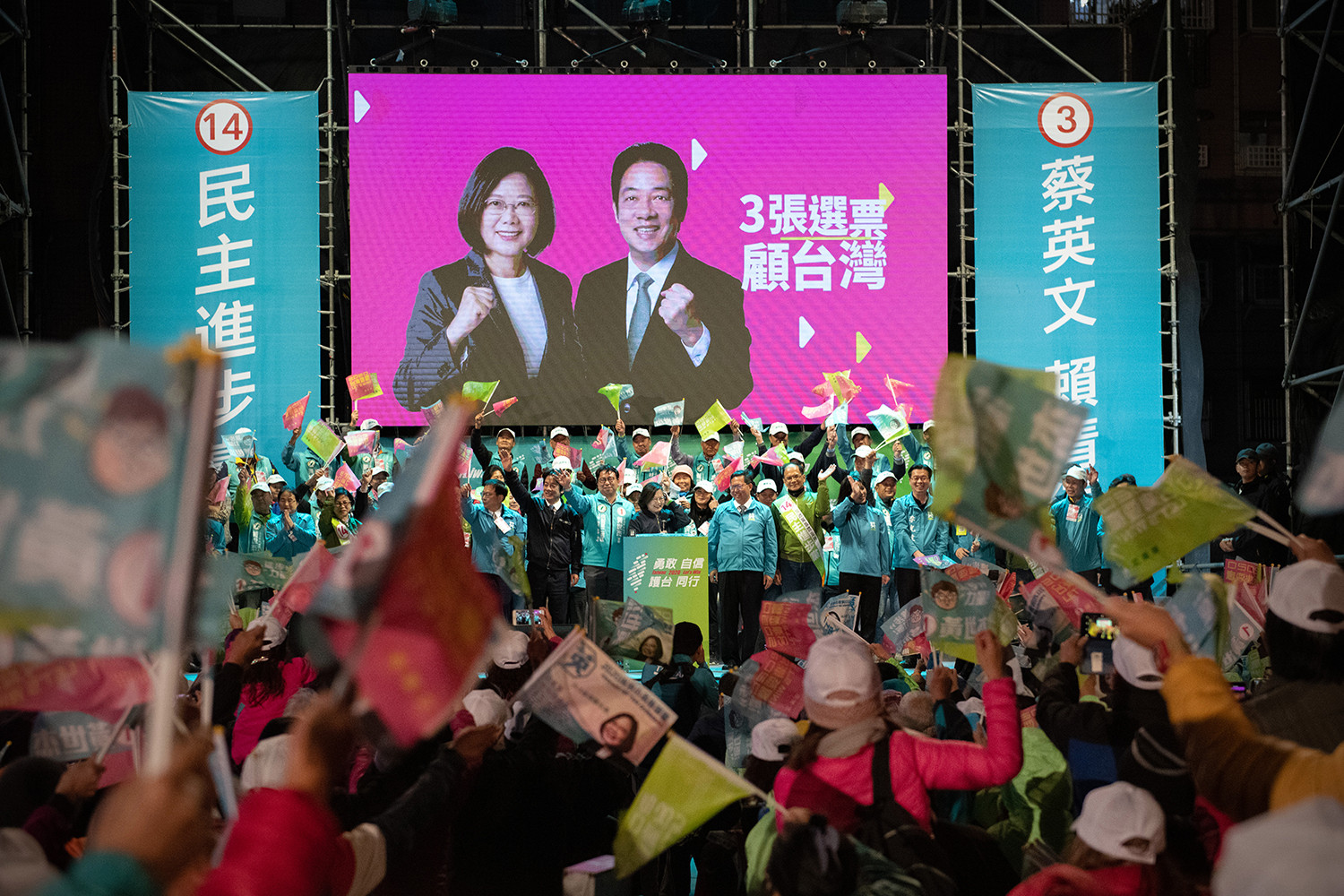
Foreign Policy (8 January 2020)
Taiwanese voters go to the polls on Saturday in the most contentious elections since Taiwan’s transition to democracy. Incumbent President Tsai Ing-wen has made the election into a referendum on Taiwan’s identity, painting her opponents as ready to hand the self-ruled island to Chinese President Xi Jinping.
Victory for Tsai now seems certain. She is consistently polling at over 50 percent, while her primary challenger, the onetime rising star Han Kuo-yu, lingers at around 15 percent. In recent months, fortunes have changed for Tsai’s Democratic Progressive Party (DPP), which suffered a serious defeat in 2018 local elections. Even in August, Tsai was barely ahead of Han, but support for her has risen as his polling numbers have crashed.
In large part, that’s because of China’s response to the democracy movement in Hong Kong. Tsai’s DPP is ardently anti-Beijing. The main opposition party, Kuomintang (KMT), is increasingly associated with pro-China policy—despite its origins on the mainland as the Chinese Communist Party’s foe. The mainland attitude toward Hong Kong has hurt the case for reconciliation between China and Taiwan: The DPP’s most recent advertisement plays to this, explicitly linking Taiwan’s cause with Hong Kong’s.
Economic concerns. Han has argued that Taiwan’s economic prospects will be threatened if it remains hostile to mainland China. Initially, that worked with voters, but Taiwan’s relatively prosperous economy and record-low unemployment have worked against the narrative. Han, meanwhile, faces accusations that he has been surreptitiously aided by the mainland from the start. Concerns over Chinese influence have been a major part of the election, with the DPP blaming the KMT for disinformation campaigns.
Failed policy. Tsai’s likely victory will deal another blow to the Chinese Communist Party’s long-term strategy of “one country, two systems”: the idea that Taiwan could nominally accept Beijing’s authority while retaining its own laws for a period, as with Hong Kong and Macao. Beijing’s soft sell has failed, but the mainland obsession with Taiwan’s so-called return to China won’t go away. Military options may even start to look more palatable.
Read more at: https://foreignpolicy.com/2020/01/08/taiwan-election-identity-tsai-ing-wen-china-disinformation/
No comments yet.
- JOHNSON TO MAKE BREXIT DEMANDS IN TALKS WITH VON DER LEYEN Europe - EU 09.01.2020
-
 IRAQI PM RECEIVED 'VERBAL MESSAGE' FROM IRAN ABOUT MISSILE ATTACK
Iraq
09.01.2020
IRAQI PM RECEIVED 'VERBAL MESSAGE' FROM IRAN ABOUT MISSILE ATTACK
Iraq
09.01.2020
-
 EU'S GREEN TRANSITION 'WILL HAVE SLIGHTLY POSITIVE ECONOMIC EFFECT'
Europe - EU
09.01.2020
EU'S GREEN TRANSITION 'WILL HAVE SLIGHTLY POSITIVE ECONOMIC EFFECT'
Europe - EU
09.01.2020
-
 CHINA STARTS IMPORTING TO TURKEY VIA BTK
The Caucasus and Turkish-Armenian Relations
09.01.2020
CHINA STARTS IMPORTING TO TURKEY VIA BTK
The Caucasus and Turkish-Armenian Relations
09.01.2020
- ARMENIAN MINISTER VISITS EMBASSY OF ISLAMIC REPUBLIC OF IRAN IN ARMENIA The Caucasus and Turkish-Armenian Relations 09.01.2020
-
25.01.2016
THE ARMENIAN QUESTION - BASIC KNOWLEDGE AND DOCUMENTATION -
12.06.2024
THE TRUTH WILL OUT -
27.03.2023
RADİKAL ERMENİ UNSURLARCA GERÇEKLEŞTİRİLEN MEZALİMLER VE VANDALİZM -
17.03.2023
PATRIOTISM PERVERTED -
23.02.2023
MEN ARE LIKE THAT -
03.02.2023
BAKÜ-TİFLİS-CEYHAN BORU HATTININ YAŞANAN TARİHİ -
16.12.2022
INTERNATIONAL SCHOLARS ON THE EVENTS OF 1915 -
07.12.2022
FAKE PHOTOS AND THE ARMENIAN PROPAGANDA -
07.12.2022
ERMENİ PROPAGANDASI VE SAHTE RESİMLER -
01.01.2022
A Letter From Japan - Strategically Mum: The Silence of the Armenians -
01.01.2022
Japonya'dan Bir Mektup - Stratejik Suskunluk: Ermenilerin Sessizliği -
03.06.2020
Anastas Mikoyan: Confessions of an Armenian Bolshevik -
08.04.2020
Sovyet Sonrası Ukrayna’da Devlet, Toplum ve Siyaset - Değişen Dinamikler, Dönüşen Kimlikler -
12.06.2018
Ermeni Sorunuyla İlgili İngiliz Belgeleri (1912-1923) - British Documents on Armenian Question (1912-1923) -
02.12.2016
Turkish-Russian Academics: A Historical Study on the Caucasus -
01.07.2016
Gürcistan'daki Müslüman Topluluklar: Azınlık Hakları, Kimlik, Siyaset -
10.03.2016
Armenian Diaspora: Diaspora, State and the Imagination of the Republic of Armenia -
24.01.2016
ERMENİ SORUNU - TEMEL BİLGİ VE BELGELER (2. BASKI)
-
AVİM Conference Hall 24.01.2023
CONFERENCE TITLED “HUNGARY’S PERSPECTIVES ON THE TURKIC WORLD"









